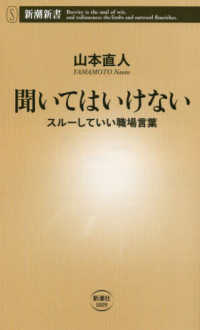Full Description
This book explores how the fathers of humanist jurisprudence contributed to the emergence of ius gentium as the common law not simply of Europe, but of all mankind, in the early sixteenth century. They did so by so thoroughly reinterpreting terms, idioms, and categories preserved within Justinian's Digest that they fundamentally transformed them to address sources and limits of political and legal authority in the broader context of early-modern state formation.
In the process, they offered theories of universal jurisprudence grounded in the attributes and actions of man and states that anticipated some of the most salient features of modern sovereignty and rights. Theories that we tend to identify with post-Reformation political and legal thought, rather than the early Renaissance.
Contents
Acknowledgements
List of Figures
Introduction Historical Imagination, Collective Memory, and the Historicization of Roman Law
part 1
Guillaume Budé: Jus, Justice, and Dignity
1 Setting the Scene Justinian's Digest and University-Based Jurisprudence
1 Corpus iuris civilis: Composition and Transmission
2 Law before Lawyers
3 Reform, Revolution, and Rediscovery
4 Modus docendi: The Methods of the Schoolmen and the Advent of the Studia humanitatis
2 Excavating, Restoring, and Redefining Jus at the Foundations of Humanist Jurisprudence
1 A Humanist, Not a Lawyer
2 The 1508 Annotationes: Answering—and Amplifying—the Call for Change
3 Hidden in Plain View: Radical Departure, Traditional Scholarship
4 Splitting Good from Fair: Accursius' Error and Budé's Entanglement
5 The Proper Method for Studying and Interpreting the Law
6 Jus as a Defining Characteristic of Justice and Man qua Man
7 Jus Has Been Given to All Mankind
8 Significance of Budé's Re-interpretation of Jus and Jus Gentium
part 2
Ulrich Zasius: Jus, Jus Gentium, and Rights
3 Re-defining Jus to Restore Justitia Ulrich Zasius' Methods in Word and in Action
1 Humanist First, a Lawyer Second
2 Combining Methods: Historicizing Law to Observe Justice
3 In Praise of the Law: A True and Useful Science
4 Theory Meets Practice: Zasius Explains His Methods
5 Ordinary Lecture, Exceptional Interpretation
6 'What Is Justice; What Is Jus?'
7 The Historical Necessity for and the Moral Authority of Lawyers and Jurists
8 'In What Manner Is Justice Divided?'
9 Methods in Action: Ex fontibus ad initium
4 Breaking with Tradition Jus Gentium as a Source of Universal Rights and Obligations
1 Disentangling Jus Gentium, Defining Natural Law
2 Defining Natural Law and Jus Gentium
3 The First Three Qualities of Natural Law: Instruction, Sociability, and Preservation
4 Jus Gentium as the Fourth Quality of Natural Law
5 Before and Beyond the Lectern: Pairing Zasius' Lecture and Lucubrationes
6 Elevating Jus Gentium
7 Distinct, but Not Divided: The Double-Aspect of Jus Gentium
8 Universal, but Not Unlimited: The Right to Resist and the Power to Punish
9 Jus Gentium as a Cache of Universal Rights
10 Jus Gentium as a Cache of Universal Obligations
11 The Limits of Slavery
12 The Trouble with Tyranny
13 Implications of Zasius' Re-interpretation of Jus Gentium
part 3
Andrea Alciati: Jus, Violence, and Imperium
5 Self-Evident Truths and Demonstrable Facts Power, Politics, and Persuasion
1 Lawyer First, Humanist Second
2 Law and Violence: Alciati's Career in Context
3 The Art of Justice, the Power of Speech, and the Necessity of Jurists
6 The Tenacity of Violence and the Parity of Right Alciati's [Re-] Interpretation ofJus, Jus Gentium, and Natural Law
1 Equality Through Enmity: War-Making as State-Making
2 Changing the Subject: Alciati's Radical Departure from His Humanist Peers
3 The Trouble with Imperium: Alciati's Novel Departure from His Scholastic Predecessors
4 Jus as Necessity in Action
5 Homicide, Commerce, and War: Meticulous Meditations on Proximate and Remote Cause
6 Slavery as a Marker of Imperium
7 Rulers and Brigands; Superior and Inferior Princes
8 Universal Empire Rejected
9 Imperium Interrupted
10 Contests Among Equals: Dueling as an Analogy to War
11 The Practical Significance of Alciati's Novel Re-interpretation of Jus Gentium in Context
12 Jus as a Marker of Equality in Humanist Jurisprudence
Conclusion The Re-formation of Europe and the Turn to Jus Gentium
Appendix: Select Emblems
Bibliography
Index








